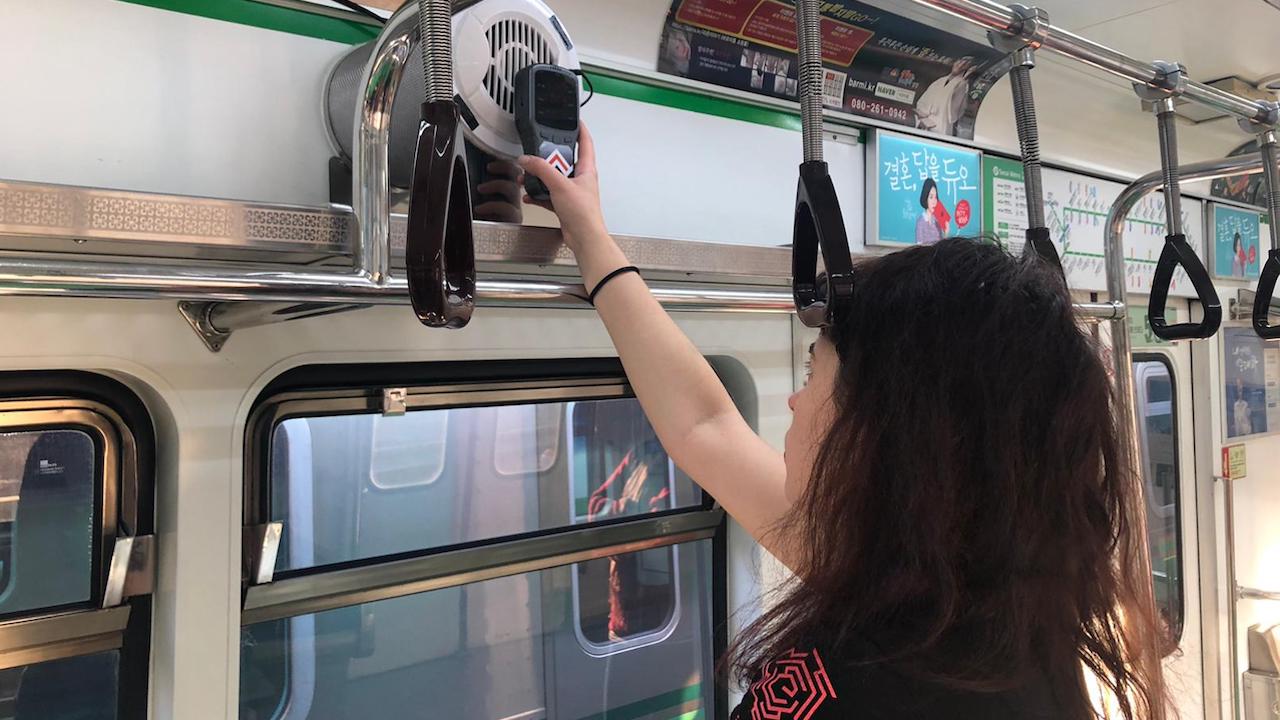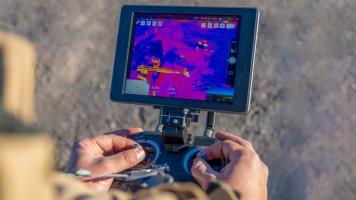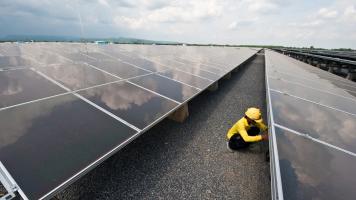
Natalia Mykhaylova, WeavAir founder and CEO, checking a device installed in a railway train in Seoul as part of a project to improve air quality in the city's metros. Photo credit: Courtesy of WeavAir.
Frontier technologies represent a $350-billion market, with the potential grow to more than $3.2 trillion by 2025.
From rice cookers and televisions to wildlife tracking collars and automated industrial machines, more devices are being equipped with sensors and internet connectivity to join a growing network of smart objects that talk and interact with each other.
Making up the internet of things (IoT), these devices churn out data and insights, which can unlock predictions that run from the mundane, whether a household is running low on milk, to business intelligence on consumer behavior, or more world-shaking information on climate events.
Statista estimates the number of such devices worldwide to almost double to 29.42 billion by 2030 from 15.14 billion in 2023.
The World Intellectual Property Office (WIPO) has touted the importance of the internet of things and other frontier technologies as they represent a $350-billion market, with the potential grow to more than $3.2 trillion by 2025. Frontier technologies also include artificial intelligence (AI), big data, and blockchain. “They hold one of the keys to addressing some of the most pressing global issues we face,” WIPO said.
WeavAir, a technology startup with a presence in Canada; Hong Kong, China; Republic of Korea; Poland; and Singapore, is one of the companies deploying the internet of things, AI, and big data to provide business intelligence solutions to help organizations and businesses meet their sustainability and net-zero goals. Using proprietary sensors, predictive AI software, satellite and drone imaging data, the company provides comprehensive insights on energy use, greenhouse gas emissions, air quality, climate risks, and other sustainability metrics. The insights provided can translate to cost-savings and operational efficiency while helping organizations plan their environment, social, and governance investments.
Restoring confidence in travel
WeavAir has been recognized with numerous awards for its solutions. One of the awards came from the Asian Development Bank (ADB), which launched an innovation challenge, the Re-establishing Tourism Confidence through Innovative Digital Solutions: Fast-tracking Tourism Recovery in Southeast Asia, in 2020 to highlight how digital technologies could help revive tourism in the wake of the COVID-19 pandemic.
WeavAir pitched a solution that leaned on the internet of things and AI-based predictive software to solve the challenge. Using insights from sensors and advanced software, it offered data-driven recommendations to hotels and resorts on air quality in their establishments, allowing early detection of potential risks, while enabling energy cost savings and improvements through automations in building operations and maintenance.
In her pitch, Natalia Mykhaylova, founder and chief executive, said WeavAir’s sensors could detect pollutants and contaminants in the air distribution systems of hotels and resorts as the company's solution was designed help manage air cooling and distribution systems in buildings.
Air conditioning, distribution, and ventilation systems are typically expensive and time-consuming to operate and maintain. There is also a lack predictive data, leading to expensive downtime and increased maintenance costs and reputation risks, said Mykhaylova, who has a PhD in chemical and environmental engineering, in explaining the rationale behind the solution.
“Our solution is designed to be simple and easy to operate. We install air quality ventilation monitoring devices. They track air quality, thermal comfort, hidden mold issues, and transmission risks for bacteria and virus such as the one that causes COVID-19," she said. WeavAir’s solution also tracks occupancy, which helps building managers to make improvements in operational processes. Real-time data is used to save costs in managing ventilation systems, building maintenance, and cleaning, while helping ensure the trust and loyalty of tenants and guests, she added.
In addition to receiving the $10,000 prize money from the ADB innovation challenge, WeavAir was also selected to pilot the solution at Fairmont Makati between 2021 and 2023. The pilot entailed installing a network of sensors in key areas of the 5-star hotel. The wireless sensors connect to the internet through the hotel WiFI or via mobile data as the devices are equipped with slots for SIM cards, which enable devices to connect to wireless networks. WIth internet connectivity, the sensors could continuously monitor the environment and a set of 20 indicators. The data is used in combination with predictive models to assess issues and anomalies that could disrupt hotel operations.
The data gathered from the pilot proved useful to the management of Fairmont Makati. “The data served as baseline for the hotel,” said Aubrey Ada, hotel manager at Fairmont Makati and Raffles.
With plans already in place for the preventive maintenance of the hotel’s air-conditioning system, having such a baseline gave the hotel an idea of air quality before and after the maintenance work, as well as the impact analysis for future projects to upgrade cooling and ventilation systems.
Ada welcomed the insights from the pilot, noting it had reinforced the hotel’s thrust to leverage on technology to improve operations. “The pandemic has shown us that it is important to be more productive and efficient. We also need to be more agile and quick in adjusting and responding to change," she said. "Fairmont would like to further leverage on technology to be able to respond and adapt to these changes in all facets of its operations.”
For confidentiality purposes, Fairmont declined to reveal insights from the pilot, but WeavAir has other case studies and projects with owners and operators of restaurants, supermarkets, malls, and office buildings. These show an average of 15%–30% operational and maintenance cost savings thanks to interventions put in place based on insights from the company.
Sustainability as a service solution
The pilot has also proved to be useful for WeavAir, which refined its product offerings based on learnings from the project as well as similar initiatives across the globe. It has since launched a new version of its sensors and software and now offers its sustainability solution on subscription basis.
While WeavAir continues to work with the hospitality industry, it has widened its target market as it saw the potential to use its solution to help companies and organizations meet their broader sustainability targets as climate change made it more urgent for every industry and organization to shift to low-carbon economy models while reducing climate risks.
“What we do at WeavAir is help our clients save time and costs and reduce risks of transition to low-carbon and energy-efficient processes with the help of accurate, continuous, and reliable data and predictive models powered by AI algorithms. We want to empower people and democratize access to this critical information and tools,” said Mykhaylova.
WeavAir continues to leverage on its expertise in environmental data science and AI as well as access to high-resolution remote sensing data from satellite earth observation, drone, and IoT network to create a digital twin solution to help organizations track their emissions, climate risks, and operational risks even in locations where installing sensors is difficult or expensive. This solution has caught the attention of sustainability fund managers, the Monetary Authority of Singapore, and the Reserve Bank of India, which are working to improve their processes to derisk and quantify the impacts of their investments.
“We are seeing a growing demand for accurate and reliable solutions that can help monitor, predict, and mitigate the emissions of establishments and assess their climate change risks,” said Mykhaylova.
Citing their experience in a project in Singapore, she said WeavAir helped the client better allocate green financing. WeavAir tracked and provided data on carbon emissions and provided temporal-spatial analysis of climate risks and deforestation rate. Such data is critical for ecological monitoring, biodiversity tracking, and in assessing the environmental impact of specific projects. These data can also help investors looking to invest in projects with positive environmental impact.
Mykhaylova is grateful to ADB and its other partners for supporting WeavAir to adopt innovations not only in the solutions it offers, but also its internal processes. “This allowed the company to quickly expand with projects across six countries. Changes in environmental regulations and increased access to accurate data sources and advanced computing resources made it possible to innovate and expand the company quickly.”
She said WeavAir is currently growing its team and partnership network in preparation for further global expansion and more product offerings. “The long-term goal is to develop a standard, scalable solution for monitoring compliance with sustainability standards.”


